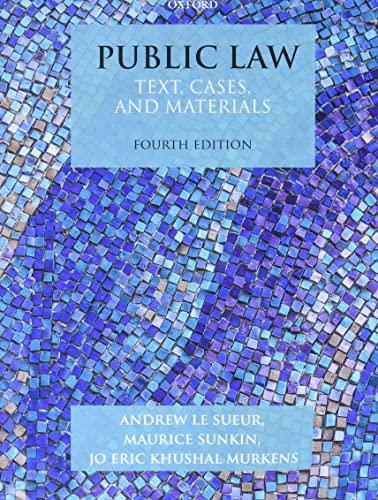Question
Question 21(1 point) Upon liquidation of a corporation, the first to be paid out are: common shareholders preferred shareholders bond holders secured bond holders Question
Question 21(1 point)
Upon liquidation of a corporation, the first to be paid out are:
common shareholders
preferred shareholders
bond holders
secured bond holders
Question 22(1 point)
The principle of limited liability means:
Question 22 options:
that the corporations liability to creditors is limited to the amount of paid up capital
a shareholder can lose no more than what he/she has paid for their shares in the event that creditors seize the corporations assets
none of the above
creditors cannot seize corporate assets
Question 23(1 point)
Officers of the corporation derive their powers from:
Question 23 options:
the Articles of Incorporation
the creditors
the directors
the shareholders
Question 24(1 point)
A bond or debenture:
Question 24 options:
makes the corporation a creditor
a security evidencing a debtor/creditor relationship
is a security evidencing an equity position
entitles the holder to vote
Question 25(1 point)
Every business corporation must:
Question 25 options:
have bonds
have shares
have creditors
none of the above
Question 26(1 point)
The Ontario government will not approve the name of a corporation which is:
Question 26 options:
a number
familiar
too long
likely to be confused with the name of some other corporation
Question 27(1 point)
A corporation's first directors are:
Question 27 options:
appointed by a management committee
appointed by creditors
elected by shareholders
appointed at the time of incorporation
Question 28(1 point)
A private corporation is the same as:
Question 28 options:
a closely held corporation
a widely held corporation
an issuing corporation
a distributing corporation
Question 29(1 point)
Rosina has recently developed a highly original computer program that, she claims, will revolutionize the practice of landscape architecture. She has been advised by a consultant that marketing the software is likely to be a highly profitable venture. However to develop and market the project will require working capital, which Rosina does not have. Fortunately her uncle, Bartolo, has agreed to put $100,000.00 of his savings into the project. With the held of a lawyer friend (who has advised them that they should each obtain independent legal advice), they have worked out a rough structure for their project, as follows: a) They will form a corporation, of which they will be the sole shareholders; b) Rosina will assign her copyright in the program to the corporation and will work full-time in developing and marketing it; c) Bartolo will contribute $100,000.00 in cash as working capital and will participate in major management decisions but will not be responsible for the day-to-day running of the business. Since Rosina will be giving up a fairly well-paid job in order to develop the new business, she is concerned that she should not be left entirely without income during the initial period (when there would be no sales revenue). In turn, Bartolo would like there to be some sort of guarantee of a reasonable return of income on his investment. Rosina should:
Question 29 options:
become a secured creditor only
become a creditor only
take preference shares
take common shares
Question 30(1 point)
The true equity owner of the corporation and the person who takes the greatest risk, is the holder of:
Question 30 options:
secured debentures
common shares
unsecured bonds
unsecured debentures
Step by Step Solution
There are 3 Steps involved in it
Step: 1

Get Instant Access to Expert-Tailored Solutions
See step-by-step solutions with expert insights and AI powered tools for academic success
Step: 2

Step: 3

Ace Your Homework with AI
Get the answers you need in no time with our AI-driven, step-by-step assistance
Get Started


